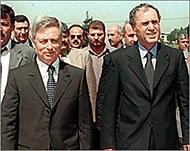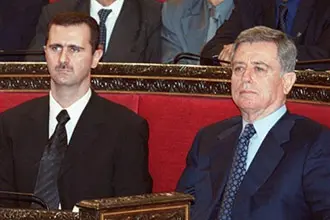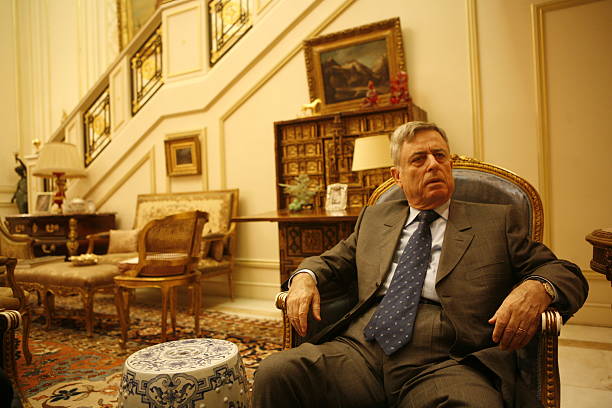Syrian Vice President Abdul Halim Khaddam said he never thought that Syria could assassinate former Lebanese Prime Minister Rafik Hariri, and that the results of the international investigation would reveal who assassinated him.
Khaddam explained in an interview with Al Arabiya channel from Paris that Syrian President Bashar al-Assad made harsh threats to Hariri months before his assassination. He said that his country had committed repeated mistakes in Lebanon and that Assad rewarded those who committed these mistakes instead of punishing him.
He pointed out that Al-Assad informed him that he told Hariri that he would crush anyone who tried to deviate from Damascus's decision. He revealed that he asked Al-Assad to dismiss Foreign Minister Farouk Al-Sharaa, who - according to him - caused the issuance of Resolution 1559.
Khaddam dropped the claim of a Palestinian suicide bomber in a videotape in which he said that an armed group killed Hariri, and said in reference to this Palestinian, “Whoever proposed Ahmed Abu Adass’s hypothesis is extremely stupid, as the bombing operation required a thousand kilograms of explosives and required technical devices to disable the jamming devices in the president’s cars.” Can Ahmed Abu Adass bring this size of explosives? And if he was in the car, where is his body and his body parts?
Khaddam also blamed Lebanese President Emile Lahoud and other Lebanese officials for inciting Assad against Hariri, who in the past was a close ally of Damascus, but who supported the UN resolution in 2004 calling for the withdrawal of foreign forces from Lebanon.
Rustam Ghazali
He said that the former head of the Syrian intelligence service in Lebanon, Rustum Ghazaleh, acted as if he was an absolute ruler there, and that he insulted Rafik Hariri, threatened him, and insulted other Lebanese officials, including Nabih Berri and Walid Jumblatt.
He explained that he tried to persuade the Syrian President to appoint another official in place of Ghazala, whom he accused of corruption, but Assad did not do so, but rather expanded his duties.
He said that he informed Al-Assad of Ghazala's insult to Lebanese officials and that he took $35 million from "Bank Al-Madina", the Lebanese bank that declared bankruptcy. Lebanese officials leveled accusations that money from this bank was used to finance Hariri's assassination. He added that Assad agreed with him and promised to replace him, but he did not do so.
Ghazi Kanaan
Khaddam said that it was likely that the head of the Syrian intelligence service in Lebanon, Ghazi Kanaan, committed suicide, explaining that “the Lebanese situation reflected on him, and they held him responsible for the accumulations in the Lebanese situation.” The International Commission of Inquiry into the Hariri assassination heard Kanaan, who headed the intelligence service between 1982 and 2002, last September in Damascus.
The official Syrian authorities reported that Kanaan, who took over the Interior Ministry in 2003, committed suicide last October with his own pistol inside his office. At the conclusion of his speech, Khaddam denied that he had been subjected to threats or harassment so far, but he expected that some of those who misled him (Bashar al-Assad) would incite him against him.
Exclusivity of power
He said that Assad's monopoly of power was the reason for the deteriorating political and economic situation of his country, adding that he resigned from his position and from the leadership of the party, but he is not estranged from Syria and has not received threats yet.
Khaddam, who resigned from his position last June during a conference of the ruling Baath Party in Damascus, said that he left all his official positions in Syria after he became convinced that the process of development and political and administrative reform would not proceed.
He added that he noticed the exclusivity and concentration of power in a way that constitutional institutions, the leadership of the party and the leadership of popular organizations were absent, and their role became to cover the decisions issued by the president. He explained that he is currently residing in Paris to quietly write his memoirs, in which he reviews “an important stage in the history of Syria and the region.”
He said that he was not subjected to abuse or threats, and "I left and my relations with President al-Assad are good and friendly. The difference in viewpoints does not change anything."
Statesmanship
Khaddam accused the Syrian leadership of not having political acumen, explaining that he presented it with a set of strategic proposals. He said, “I believe that if President Bashar al-Assad had adopted this strategy, Syria would not have fallen into these minefields and we would not have faced external and internal difficulties, because the biggest problem is that the state When it has no policy, it is walking on a path full of mines and in complete darkness.”
He described the Syrian president as "emotional" and said that he "gets excited when someone gives him news and he makes a decision, and after a while he discovers that what he learned is incorrect, so he takes the initiative to correct the mistake he committed."
Khaddam spoke of "the increase in laxity and the increase in corruption," referring in particular to "the close circle of relatives and friends." He stressed that "the law is absent, and what is present is the closed circle surrounding the ruling."
It is noteworthy that Khaddam was considered in the 1980s as a potential successor to the late President Hafez al-Assad, but he then supported Bashar, who took power in 2000. When he resigned, he said that he wanted to make room for new blood.



